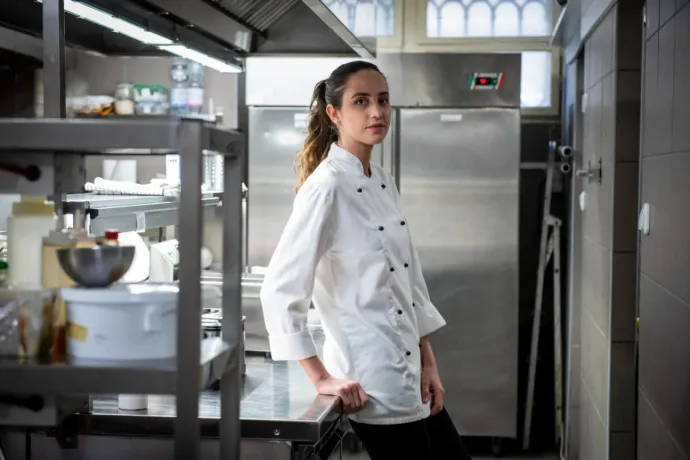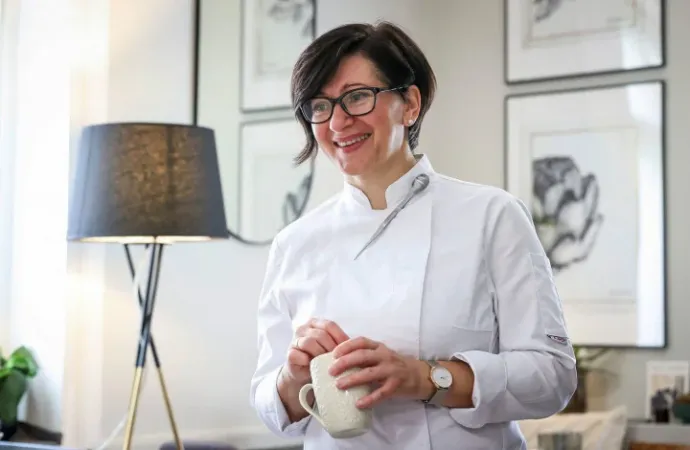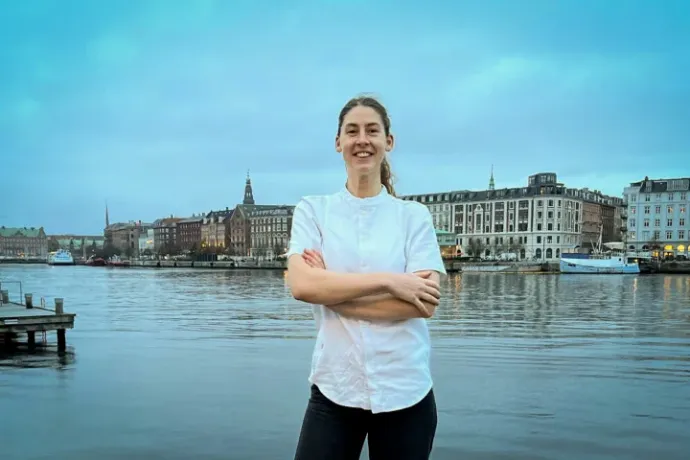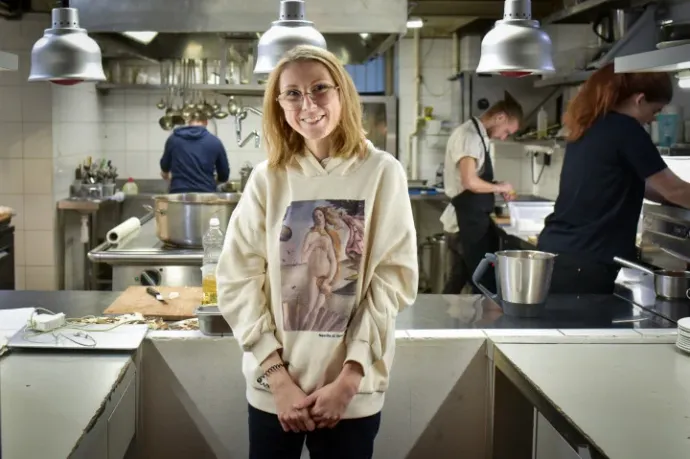
Four women working in restaurant kitchens (three chefs and a pastry chef) told us about the beauty and the difficulties of their profession. They told us how women are treated in an environment where at best three quarters of those in the kitchen are male, and why so few women enter the profession. Chef-owner Krisztina Katkó (Alkimista), pastry chef Csenge Dusha (MÁK Bistro), chefs Tímea Rakonczai (Architecto Pitpit) and Anna Pokorny talk about their strategies for surviving in the midst of the banter, the masculine atmosphere, the flying pans and loud heavy metal music.
Anna Pokorny was a chef in a bistro in Pest before moving on to a restaurant in Copenhagen. She works 12 to 14 hours a day: in the morning they put away the delivered groceries, then after a meeting, the different parts of the menu’s various elements are prepared, and then the service begins, which lasts until late at night. "There is a lot of tension in the kitchen. The head chef is constantly on top of us about everything, at times I feel it's impossible to fit so much into one minute. I serve, l load the plates, I take away the dirty ones, and all the while the instructions keep on coming: wipe, is there enough of this, refill, run to the back, go upstairs. The chef never praises us, and by this, he motivates us to be better and better. We know very well what this is about, and we understand that if we've done something well, we have to acknowledge it internally, to ourselves. If he praised us, we would probably relax and get carried away or lose focus. Of course, a lot depends on the person's style, they have to be the type of person who says these things again and again, but never in a hurtful way." In spite of all this, Anna loves the job. "It's so thrilling, it fills me with energy, I feel alive. It's like the old days when we used to dance to loud music at parties."
Krisztina Katkó quit journalism at the age of 39 to start a family business. She was happy to make the transition from humanities to a manual job, although many were doing this around that time. She is the chef-owner of Alkimista in Szeged, a tiny 16-seat restaurant that focuses on themed evenings and regional ingredients. She says that in some ways it's quite convenient: you don't have to run everything through a decision-making network, you manage a small team and the concept is easy to control. On the other hand, it's difficult, of course, because there are a lot of other tasks, like accounting, invoicing, ordering, dealing with the merchandise, communication – running a restaurant is never finished.
Krisztina says that the reason why she is able to do what many people can't, is because her story is unlike most chef's stories: she has only been in the business for ten years, not since she was 18. "I started when I was thirty-nine, as a mature person with small children: I focused on the fact that I had no time to waste. In the kitchen, many often say that this is our life, but I never considered my work my life. Success is important, it gives you confidence and stability, but it's not worth sacrificing everything for it. At the same time, I don't know what idle time is, I have never owned a pair of sweatpants," Krisztina says about the beginnings of her career as a chef.
Her time at the Olimpia restaurant was the most defining experience for her. She says that at the time of chef Lajos Takács, the place was "a pirate ship, an astral coincidence, a constant creative process, as if paintings were always being created".
"I never dared to cry because I'm a girl, I knew I had to be the strongest one. If I had let myself go, they would have immediately said: Of course, girls cry."
According to her, kitchens are not democratic systems, there is a hierarchy, like in the church or in the armed forces. You have to run systems, you have to work with raw ingredients, you have to be getting somewhere. "If someone expects a kitchen to be like a cooking class, it’s not like that, but if someone says it's hell, that's not true either. You have to adapt, there's a lot of pressure, it requires fast and accurate physical work."
According to Krisztina, management methods are undergoing a change regardless of gender. It's no longer cool to shout in the kitchen for no reason, a firm but supportive style is more effective instead. "The chef's goal is to make everyone aware of the consequences of their actions, to take ownership of the whole thing, but you can't achieve that by shouting. If a cook messes up and the whole service is upended, and I tell him to go out to the guest and explain that he was the one responsible, he will finally understand." This new style of leadership also suits women better, she says.

Csenge Dash designs and executes desserts for high-end restaurants. She recently moved from Michelin-starred Salt to MÁK Bistro, and like other female chefs, spends almost her entire life working on food. She says it's not a good habit to have no boundaries between her work and her personal life, and while she hardly ever went home from her previous place of work, she now does part of her work at home. "When I get up, I start the amazaki at home, which takes eight hours to finish. Then I carry the semi-finished ingredients into the restaurant." She works from morning till late evening, with the pace varying – depending on whether she is prepping or serving.
At her first big restaurant job, she was initially anxious and panicked much. "I was making cakes non-stop, and when I had thirteen of them lined up, but had to give out the food to be served, I freaked out, I didn't know how to manage so many different things perfectly at the same time." Csenge says it's the adrenaline that gets everyone through the day, so she does the same thing as the guys. At her first job, the pans would still fly at times and she couldn't cope with the pressure: one day she woke up unable to go in. "From then on, I put on a mask at the restaurant, I show myself strong, and this goes on until midnight, when I suddenly feel tired, but only my loved ones get to see that."
Csenge says the hardest thing about the restaurant kitchen is that a completely different attitude is needed for creating a dish than for delivering it day in, day out, with the same perfection. "When you get into the daily routine, it requires a completely different person than the creative part of the job. One takes finesse, the other takes strength. Although I'm mentally preparing the next menu, I'm also managing the day's processes. For me, memory comes first when building a dish, but if I were to conflate that with the daily tasks and production, the dessert wouldn't be able to breathe. If I work six days straight, I get so saturated that I'm not able to flip through books and conjure up memories on the seventh day. Although I find joy in the daily grind of just watching the pastries smile – I also like to be present in the daily production, always making sure they're just as beautifully cracked as usual." In the future, Csenge hopes to develop a work schedule that allows her to have a baby, so that she can focus on creating and intellectual work in the longer term. She knows that to do this, she will have to let go of the need to check every single pastry personally.
Tímea Rakonczai has been a cook for five years. The 28-year-old started three universities and then realized that what she really wanted to do was cook. She has worked in bakeries, cafés and various restaurants. What she likes about her job is that she can be creative. It makes her feel good that, despite the hierarchical system, she is in control and has a career that she is responsible for. This brings great stress and can be a burden, but also gives her great joy. And when she can invent new things, that's the best thing," she says.
"I became a chef because I loved to cook dinners at home for my loved ones. But once I became part of live service, I saw that the focus was no longer on cooking, but on logistics, speed and precision, all of which require strength. The kitchen really is a different world. You're locked in with a lot of very tired people, you have a lot of responsibility, there's a lot of tension, and a lot of people try to defuse that with aggression and being loud." Just like the others, Timi works 12-14 hours a day, with some prep time every day, followed by service. And on her days off, despite the physical strain, or actually because of it, she goes to the gym: "It's incredibly hard, but you have to do it, otherwise you'll break down," she says.
While mental and physical fatigue is hard, she finds her work emotionally exhilarating. "Knowing that the customer liking the food is up to me is a euphoric feeling." She currently works in a tapas bar, where a ton of different slips come in for lots of completely different dishes. "The order in which I put each dish together so that there's always something in front of the guest is up to me." Timi has also been gradually getting used to being decisive in the kitchen. "I've had a hard time because I was timid, I had to realize that nobody cares about my problems unless I voice them."
What’s it like for a woman in the kitchen?
Anna Pokorny was happy to have female chefs at both her previous and current workplace, but she still only has a handful of female colleagues. "It's not very pleasant for a woman's ears to listen to "guy talk" all day long. It often makes me feel like an outsider, like I can't relate to the others. At such times, it's good to have a few female colleagues to stick together with," she says.
In Anna's experience, banter between colleagues is common in any kitchen, but perhaps men get over it sooner. She sometimes takes it personally and is sensitive about it. It's not a good idea to hit back, because that can start a never-ending power struggle and you will no longer be seen as an equal. "I've had people call me out because I have an annoying voice when I'm announcing orders." Anna says there's nothing wrong with jokes, as long as their style is not offensive, but there's no time or place for personal banter. "It's happened before that two of us girls were working with a guy and he wouldn't speak to us all day."
In her experience, this behavior tends to be more common among colleagues, while chefs generally try to promote peace and treat everyone equally. Anna says the give and take goes on in the kitchen irrespective of gender, but she feels that if a girl makes a mistake, it is sure to be talked about and laughed about for weeks afterwards.

You need to be gritty and self-confident in the kitchen, otherwise the soft, feminine voice gets lost in the noise. "After a while, I learned to take what someone says as advice, not as an insult, to try to cooperate, to work in the system, to support others. The comments may be personal or professional. With the former, you have to learn to brush it off, but the latter is good, it makes you grow. When someone asks for something, you have to do it quickly, and not get caught up with taking offense, because if one person stops, everything begins to slip."
Although more and more restaurants are looking for female chefs, there are still far more men than women in the field. "The reason why there are so few female chefs may be because we lose our feminine qualities, we have to go in with our hair tied up, we always have dirty nails, and we wear the same chef's coat every day.
Restaurant cooking has nothing to do with the classic role of the homemaker cooking at home, this is manual labor. Many of my female colleagues say it's impossible to combine this kind of work with having children, adding that once they start a family they will certainly look for a different line of work."
Timi Rakonczai says that women approach this job from a completely different angle than men. Having a woman in the kitchen disrupts the masculine atmosphere. She has found that cooks are much nicer to each other as well when there is at least one woman among them, they are more courteous. "Physically I do the same things as the boys, I very rarely ask for help, I try to manage everything myself. We, girls struggle much more than the guys. I constantly have to prove that I can do the same things as the others."
She behaves differently in the kitchen than the guys do. She says she tries to mediate and listen, she encourages everyone to help each other – these are feminine qualities that are good for everyone, she adds. Sometimes the others don't buy it, but they usually realize later that there is something in what she says. "If I'm the only girl there and I ask my (male – TN) colleague nicely to fry something a bit longer or to add something else in, he gets offended. But if I add that if it's a problem for him, then I'll do it – they start to give in."
In Timi's opinion, it's okay to cry in a kitchen, because not crying is not a sign of strength, crying is just a form of emotional expression. She prefers it if work doesn't stop at such times, and everyone just moves on, because with the tears, the tension has already gone. One thing she doesn't like being told on a bad day is that she must be crying because she's on her period. In spite of all this, she loves working with men.
According to Csenge Dusha, having women on staff is good for any kitchen. In many kitchens with more male chefs, heavy metal music is playing non-stop, but that beat is not for everyone. She can put up with it for a few songs, but then prefers some quieter music which she finds more inspiring. Where there are more girls on the team, balancing these things is easier.
In Csenge's opinion, anyone who works in a restaurant knows the physical and mental burden they are undertaking, whether they are a woman or a man. "I may not be able to do it forever, but I know what I've signed up for. Sometimes I get tired during service, the dishes to be sent out keep piling up and I need an extra hand, but at such times we help each other." She also talked about how different it is to work in an open kitchen. "It's hard because you have to look good, and if you get tired or dirty you can't get away. But on the other hand, it empowers you to stick it out, to be relaxed and to calmly wait for the next guest – knowing that you are seen is inspiring. It happened to me once that some oil splashed in my eyes and I cried, so I was told to leave the kitchen."

Once, a guy and I both came in early and he put me on the counter and started groping and kissing me – I don't know what would have happened if a colleague hadn't come in. That said, I don't think girls and guys are treated differently, it's more about the individual. Being loud and demeaning is not so fashionable any more. There are female chefs who strike a tougher tone than men, but I don't think that's necessary. In fact, we need girls in the kitchen to bring in some softness. The feminine refinement is infused into the processes and that’s good for what we do."
Why are there so few female chefs?
According to Timi Rakonczai, the reason why there are so few female chefs is that it is not a family- and relationship-friendly job. Another problem is the stereotypes that claim it's a man's job. "Everyone's reaction to me is, 'Oh my God, you're a chef, you don't look like one, why don't you just cook at home? Why don't you get a proper job?" At a job interview once, Timi was asked if she was sure she wanted the job (being a woman). They thought she wouldn't be able to handle it. In places where they gave her a chance and invited her for a trial day, she proved them wrong. Even when meeting a potential boyfriend, everyone is surprised, because they imagine a cook to be an old lady from the school cafeteria.
Despite all the difficulties, she loves her job, even though she has no evenings off and will have to think about how she can have a family. Sometimes it bothers her that she can't dress up nice and that she always smells a bit of food, as she is around ovens and fryers all day. At the same time, she likes to change into her nice chef's coat before service, because she feels it also provides a well-groomed and neat look.
According to Kriszta Katkó, women in Hungary today have different opportunities than men, as they carry the burden of housework and childcare as well. Although there is talk of sharing the burden, in practice this hasn't changed. "I understand that working sixteen-hour shifts really seems impossible for young female chefs, when even making sure you have a clean chef's coat every day is a challenge.
It annoys me when people ask me how my family feels about me being a chef. Men are rarely asked that, it's simply assumed that as a woman my primary job is to look after the family – which is pretty much the case."
According to Krisztina, the playing field is not level: men's careers and jobs are important because they define themselves through their successes and victories. "And I'm wondering if my kid has clean gym clothes while I'm standing there doing the evening service. My desires shouldn't be defined by my gender, but my opportunities are certainly affected. If my child has chicken pox I feel that I'd rather be there and it's hard to focus. I have more lives, which is both a blessing and a curse. It's a blessing because I have another life where I'm safe, but at the same time I have another focal point to attend to with the same energy as in the job where I'm competing with men," she explains.
At the same time, she stresses that being a mother and a woman gives her confidence. “When I'm in a desperate situation in the kitchen, when everything is going wrong, when there's tension, I remember that I've given birth to three children, I've been at the crossroads of life and death...so what if a pot is dropped? Nothing. When I visualize my purpose, I am protected by the fact that I am a woman and a mother. When someone ignores all of that, it should be shrugged off because calling in from the sidelines is ridiculous.”
If you enjoyed this article, and want to make sure you don't miss similar ones about Hungary in the future, subscribe to the Telex English newsletter!